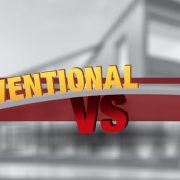Top 10 Truths: Conventional Loans vs. FHA Loans
Conventional loans and FHA loans are the most common 30-year fixed rate programs out there today.
Here are the top 10 things you need to know about conventional vs. FHA loans:
- Conventional loans only require mortgage insurance when the down payment is less than 20%. FHA loans require mortgage insurance on all loans regardless of the down payment.
- FHA and Conventional loans both are NOT first-time home buyer programs.
- Conventional Loans charge less in monthly mortgage insurance premiums than do FHA loans. In fact, FHA charges some of the highest monthly mortgage insurance premiums in the business–up to three times more than conventional loans, depending on the buyer’s FICO score.
- FHA calculates the cost of monthly mortgage insurance based on the down payment and loan amount. Conventional loans do the same but, in addition, take the borrowers’ FICO score into consideration. FHA’s mortgage insurance premiums are unaffected by a low or high FICO score. A high FICO score makes a big difference in mortgage insurance premiums for conventional loans only.
- FHA charges a one-time upfront mortgage insurance fee in addition to monthly mortgage insurance fees. Conventional loans do not have this requirement. FHA does allow the option of financing the fee into the loan OR paying it out of pocket. 99% of all FHA buyers finance the fee into the loan.
- FHA requires mortgage insurance for the life of the loan. Conventional loans only require mortgage insurance until 20% equity in the property has been reached, either because the principal loan balance has been paid down or the property has gone up in value.
- FHA allows buyers to have less-than-stellar credit yet still qualify for a loan. Conventional loans have stricter credit guidelines.
- FHA is best known for the low minimum 3.5% down payment. Conventional loans require 5% down for loans up to $417k and 10% down in “high-balance” areas. Not all counties offer high-balance conventional loans. Check the Fannie Mae website for loan limits in your area.
- FHA and Conventional loans both offer a way for buyers to generate lender credits (money) by raising the interest rate slightly from the current rate. FHA loans tend to generate more credits than Conventional loans. Lender credits can be applied to the buyer’s closing costs.
- FHA is only a good option if a Conventional loan is not an option.
Whether you’re just starting to shop for a loan or you’re a seasoned veteran, understanding the details of these loan programs can be a bit confusing. If you have additional questions, email me anytime.




